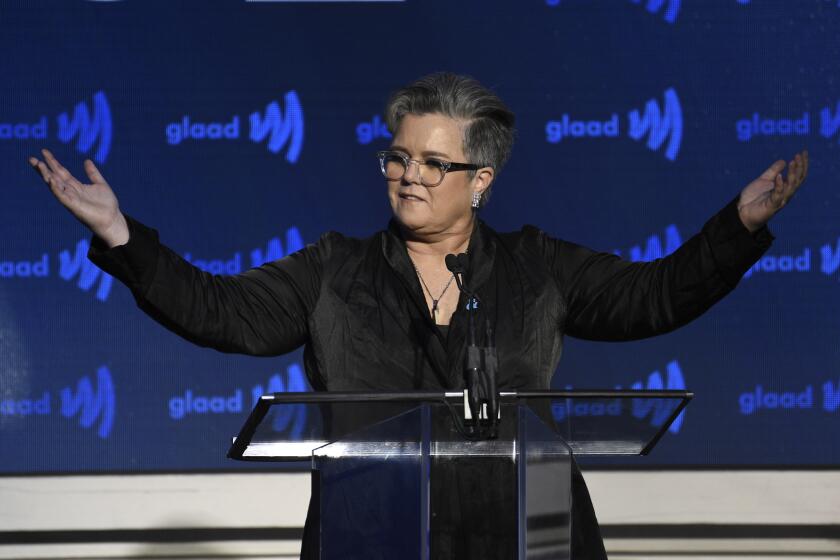Column: Who won ‘Game of Thrones’? From first to last, Peter Dinklage
Warning: This story contains spoilers for the finale of “Game of Thrones.”
The biggest trick “Game of Thrones” played on its audience was not the two-season buildup to a battle with the Night King that lasted only one episode or the survival of way more Dothraki than seemed possible after that big “lights out” scene.
It wasn’t the earned/not-earned moment when the dragon queen decided to torch Kings Landing or even the surprisingly immediate agreement of everyone that Bran Stark should be king of Westeros.
The biggest trick “Game of Thrones” played on its audience didn’t even happen in the final season; it happened in the first.
When Sean Bean’s Ned Stark was beheaded in the penultimate episode of Season 1, the world gasped — how could a show survive the sacrifice of its star?
But Bean was never the star of “Game of Thrones.” Peter Dinklage was, and he carried the series from beginning to end.
FULL COVERAGE: The final season of ‘Game of Thrones’ »
As Tyrion “the Imp” Lannister, Dinklage entered the story as the truth-teller disguised as the fool. Hated by his powerful father and seen by most others as an object of curiosity and/or derision — the Imp — Tyrion was the ultimate insider-outsider. His name gave him front-row access to the game of thrones; his stature kept him from ever being taken seriously as a player.
But player he was, and for all his mistakes, a master player played by a master.
Having brokered the original deal between fire and ice, it was Tyrion who ended Daenerys’ brief reign by persuading Jon Snow to kill her. It was Tyrion who chose Bran as king, Tyrion who, as Bran’s Hand, will effectively rule Westeros, from its sewers to its navy.
All without looking like he was an evil-genius mastermind.
And it was Dinklage who had to sell the whole “wait, what?” finale. First with a monologue about love and duty, then with a paean to storytelling and finally with a humorous denouement, overseeing a bickering new small council after having been presented an official history that omitted him altogether.
‘Game of Thrones’: Daenerys actress Emilia Clarke was unsure about the finale. She called her mom »
In other words, Peter Dinklage had to land the entire freaking series pretty much by himself.
A big job for a single actor, but then Dinklage has done most of the show’s heavy lifting from the very beginning. It’s no accident that while the last season marked the first time many of the actors had worked together, Dinklage had had scenes with most of the principal cast over multiple seasons.
Throughout the series, Tyrion provided the viewer’s portal into Westeros. He was a serious man who no one took seriously, a fact that broke his heart even as he used it to his benefit. People said things to him that they would never say to someone they considered a threat, and as he had nothing to lose but his life, Tyrion was able to act outside the rules of the game.
Since no one expected anything of him, he could do what he wanted and go where he wished. Playing the jaded drunk, he had all the best lines, but they were inevitably based in self-knowledge and, more important, an empathetic heart.
Dinklage made Tyrion admirable from the moment we first met him. And that took some doing, considering that that was while he was on the receiving end of ministrations from the first of many prostitute companions, a woman who described his reputation as “a drunken little lecher prone to all manner of perversions.”
We instantly suspected this wasn’t true — unlike most of the show’s other brothel patrons, Tyrion always treated prostitutes with non-man-handling, friendly respect — and when he later sympathetically advised Jon that he wear his title of bastard “like armor,” we knew exactly who he was.
The show’s only true hero.
‘Game of Thrones’ series finale ends more with an exhale than a bang »
Much was made of Ned Stark and Jon Snow’s nobility, but it was Tyrion who offered aid, comfort and protection wherever and however he could — designing a saddle for Bran, shielding Sansa from Joffrey, repeatedly trying to save Cersei from herself, saving Catelyn Stark while she had him prisoner, begging Daenerys to show restraint. He even overtipped.
Everyone considered Jaime, Arya and Brienne brave, but Tyrion was constantly attempting to thwart psychopaths and offering unsolicited, if wise, advice to murderous people who hated him even though he had zero fighting skills.
Varys claimed he was on the side of the people, but he had spent his adult life in Kings Landing, while Tyrion had been to the North, the Wall, the Eyrie and even Greyscale Island.
And it’s a good thing Tyrion moved around so much, because no matter what kind of over-the-top green-screened craziness had just occurred, a scene between Dinklage and someone would instantly re-ground the show in emotional reality.
He made Tyrion funny without being cruel, kind without sticky sentiment, wise without pontificating, angry without being vicious. OK, he strangled Shae and shot his father with a crossbow, but the first was self-defense and the second, well, the only reason to mourn Tywin’s death was that it meant the exit of Charles Dance, who is always so good playing bad.
Some questions the ‘Game of Thrones’ finale left unanswered »
In fact, beginning with Ned, the deaths of so many high-profile characters slowly decreased the number of fine and notable actors — Michelle Fairley, Ciarán Hinds, Jonathan Pryce, Diana Rigg, Natalie Dormer, Aidan Gillen, Conleth Hill — that by the end, Dinklage was one of the last distinguished actors left; most of the remaining leads had begun their careers on “Game of Thrones.”
Whether the finale lived up to the high standard of the show is open to endless and fevered debate, but in Dinklage and Tyrion, at least, D.B. Weiss and David Benioff saved the best for last.
More to Read
The biggest entertainment stories
Get our big stories about Hollywood, film, television, music, arts, culture and more right in your inbox as soon as they publish.
You may occasionally receive promotional content from the Los Angeles Times.











